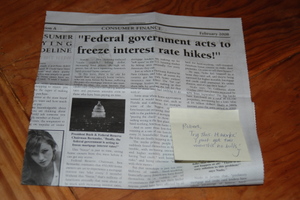Last Friday, Governor Gregoire signed SB 6381 into law giving fiduciary duties to mortgage brokers. This new law does not apply to loan originators who work for bank-mortgage companies (like WaMU, Countrywide, Wells Fargo, Chase, Bank of America, etc).
Here are some of the highlights of what the law spells out for loan originators who work for mortgage brokers:
- A mortgage broker must act in the borrowers best interest and in the utmost good faith towards the borrower
- A mortgage broker shall not accept, provide, or charge any undisclosed compensation or realize any undisclosed remuneration that inures to the benefit of the mortgage broker on an expenditure made for the borrower.
- A mortgage broker must carry out all lawful instructions provided by the borrower.
- A mortgage broker must disclose to the borrower all material facts of which the mortgage broker has knowledge that might reasonably affect the borrowers rights, interest or ability to receive the borrower’s intended benefit from the residential mortgage loan.
- A mortgage broker must provide an accounting to the borrower for all money…received from the borrower.
All of the above seems pretty straight forward to me and SHOULD all ready be happening when consumers work with a mortgage professional. I have always put my clients best interest first–above mine. The next two points are more surprising:
- A mortgage broker may contract for or collect a fee for services rendered if the fee is disclosed to the borrower in advance of the provision of those services.
This will allow mortgage brokers to charge a fee for consultation, credit repair, working on preapprovals. This could change how a Washington State mortgage broker is paid and how much they charge in origination.
- The fiduciary duty in this section does not require a mortgage broker to offer or obtain access to loan products and services other than those that are available to the mortgage broker at the time of the transaction.
I see this last point as a conflict with the entire bill. What if the best loan for a consumer is FHA or VA and the mortgage broker does not have those loans available so they shoe-horn them into a loan they do have access to? How is that acting in the clients best interest? The other side of the coin is that if a mortgage broker has never provided a certain product (such as FHA or VA mortgages); how would they know if the consumer would be better off with these loans?
Note to Consumers and Real Estate Agents: If you are a first time home buyer, have credit scores below 700 or are putting less than 20% down; ask your mortgage broker if they are able to provide FHA financing. Those who have served our country should ask if VA financing is available.
Jillayne Schlicke wrote an interesting post on this earlier this month at Rain City Guide. This law is yet another reason why consumers may want to select a loan originator classified as a licensed loan originator working for a mortgage broker over a loan originator who works for mortgage-bank.













Recent Comments